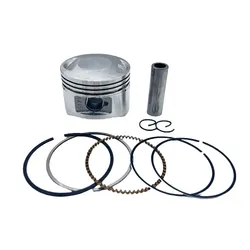How Do Motorcycle Engine Parts Affect Performance?
2024-12-23
When it comes to motorcycle performance, every engine component plays a pivotal role in how the bike behaves on the road. From acceleration to fuel efficiency, the condition and quality of these parts can significantly impact your riding experience. In this blog, we will explore how various motorcycle engine parts contribute to overall performance.
1. Cylinder and Piston Design
The cylinder and piston size directly affect engine displacement, which is a key factor in determining a motorcycle's power output. Larger cylinders and pistons allow for more air-fuel mixture, resulting in higher combustion power. However, this can come at the expense of fuel efficiency. Balancing cylinder and piston size can optimize performance for both power and efficiency, depending on your riding style.
2. Crankshaft and Power Delivery
The crankshaft’s design and its ability to convert linear piston motion into rotational power are crucial for smooth acceleration. A well-balanced crankshaft ensures the engine runs smoothly without unnecessary vibrations, which can affect ride quality. The crankshaft’s design also influences engine response time; lightweight and high-performance crankshafts allow for quicker throttle response and improved power delivery.
3. Camshaft and Valve Timing
The camshaft is a critical part of engine performance, as it controls the timing of the intake and exhaust valves. Performance camshafts, often found in racing motorcycles, can increase horsepower by optimizing the intake of air and fuel and the expulsion of exhaust gases. The timing of the camshaft can also affect engine RPM (revolutions per minute), with advanced timing often boosting high-end power at the cost of low-end torque.
4. Exhaust System
The exhaust system, though often overlooked, plays a major role in engine performance. A high-performance exhaust reduces back pressure, allowing exhaust gases to exit the engine more quickly. This increases the efficiency of the combustion process, leading to more power. Upgrading to a sport exhaust system can give your bike a noticeable performance boost, especially at higher RPMs.
5. Fuel System and Tuning
The fuel system, including carburetors or fuel injectors, plays a significant role in performance. Proper tuning of these systems ensures that the engine receives the right air-fuel mixture for maximum power. Inadequate fuel delivery can cause poor acceleration and misfires, while over-fueling can lead to excessive fuel consumption and poor efficiency. Tuning the fuel system based on altitude, temperature, and riding conditions can significantly improve performance.
6. Ignition System and Spark Timing
The ignition system controls when the spark plug fires to ignite the air-fuel mixture. The timing of this spark is crucial for maximizing power. Advances in ignition technology, such as electronic fuel injection (EFI) and advanced ignition mapping, allow for more precise control of spark timing, leading to better throttle response, smoother idling, and improved power output across a range of RPMs.
7. Cooling System and Engine Longevity
The cooling system plays a vital role in maintaining optimal engine temperatures, which directly impacts performance. Overheating can lead to loss of power, excessive wear, and even engine failure. A properly functioning cooling system ensures that the engine operates at its peak efficiency, especially during long rides or in hot weather conditions.
8. Lubrication System and Friction
The lubrication system reduces friction between moving engine parts, helping to keep the engine running smoothly. High-quality oil and a well-maintained lubrication system can reduce engine wear, increase performance, and improve fuel efficiency. Proper lubrication is especially important in high-performance engines, where the parts experience greater stress.
Conclusion
The performance of a motorcycle is a result of how well each engine component works together. From the design of the pistons to the tuning of the ignition system, every part contributes to how efficiently and powerfully your bike runs. By upgrading, maintaining, and understanding the role of each part, you can fine-tune your motorcycle for better performance, whether for racing, touring, or daily commuting.



